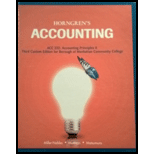
Concept explainers
Concept Introduction:
Assets: These are resources which the company owns and will generate future economic benefits. The assets are categorized into fixed asset which will help in generating revenues for long period of time and examples is plant and machinery, building , equipments etc and current assets are resources which will be converted into cash within one year examples are
It always shown in percentage
Profit Margin Ratio: This ratio determines the percentage of operating profit on net sales and the formula to calculate it is given below
It always shown in percentage
Asset Turnover Ratio: This ratio determines shows efficiency of average total assets in generating sales revenue the formula to calculate it is given below
It always shown in times
Expanded Return on Investment Formula: This formula is taking into account combined effect of Profit margin ratio and Asset turnover ratio and its final result is equal to return on investment. The formula is given below
To Prepare:
Calculate expanded return on investment for the year 2017 for Thompson Toy Company
Want to see the full answer?
Check out a sample textbook solution
Chapter 24 Solutions
ACCOUNTING PRINCIPLES 222 5/16 >C<

 AccountingAccountingISBN:9781337272094Author:WARREN, Carl S., Reeve, James M., Duchac, Jonathan E.Publisher:Cengage Learning,
AccountingAccountingISBN:9781337272094Author:WARREN, Carl S., Reeve, James M., Duchac, Jonathan E.Publisher:Cengage Learning, Accounting Information SystemsAccountingISBN:9781337619202Author:Hall, James A.Publisher:Cengage Learning,
Accounting Information SystemsAccountingISBN:9781337619202Author:Hall, James A.Publisher:Cengage Learning, Horngren's Cost Accounting: A Managerial Emphasis...AccountingISBN:9780134475585Author:Srikant M. Datar, Madhav V. RajanPublisher:PEARSON
Horngren's Cost Accounting: A Managerial Emphasis...AccountingISBN:9780134475585Author:Srikant M. Datar, Madhav V. RajanPublisher:PEARSON Intermediate AccountingAccountingISBN:9781259722660Author:J. David Spiceland, Mark W. Nelson, Wayne M ThomasPublisher:McGraw-Hill Education
Intermediate AccountingAccountingISBN:9781259722660Author:J. David Spiceland, Mark W. Nelson, Wayne M ThomasPublisher:McGraw-Hill Education Financial and Managerial AccountingAccountingISBN:9781259726705Author:John J Wild, Ken W. Shaw, Barbara Chiappetta Fundamental Accounting PrinciplesPublisher:McGraw-Hill Education
Financial and Managerial AccountingAccountingISBN:9781259726705Author:John J Wild, Ken W. Shaw, Barbara Chiappetta Fundamental Accounting PrinciplesPublisher:McGraw-Hill Education





